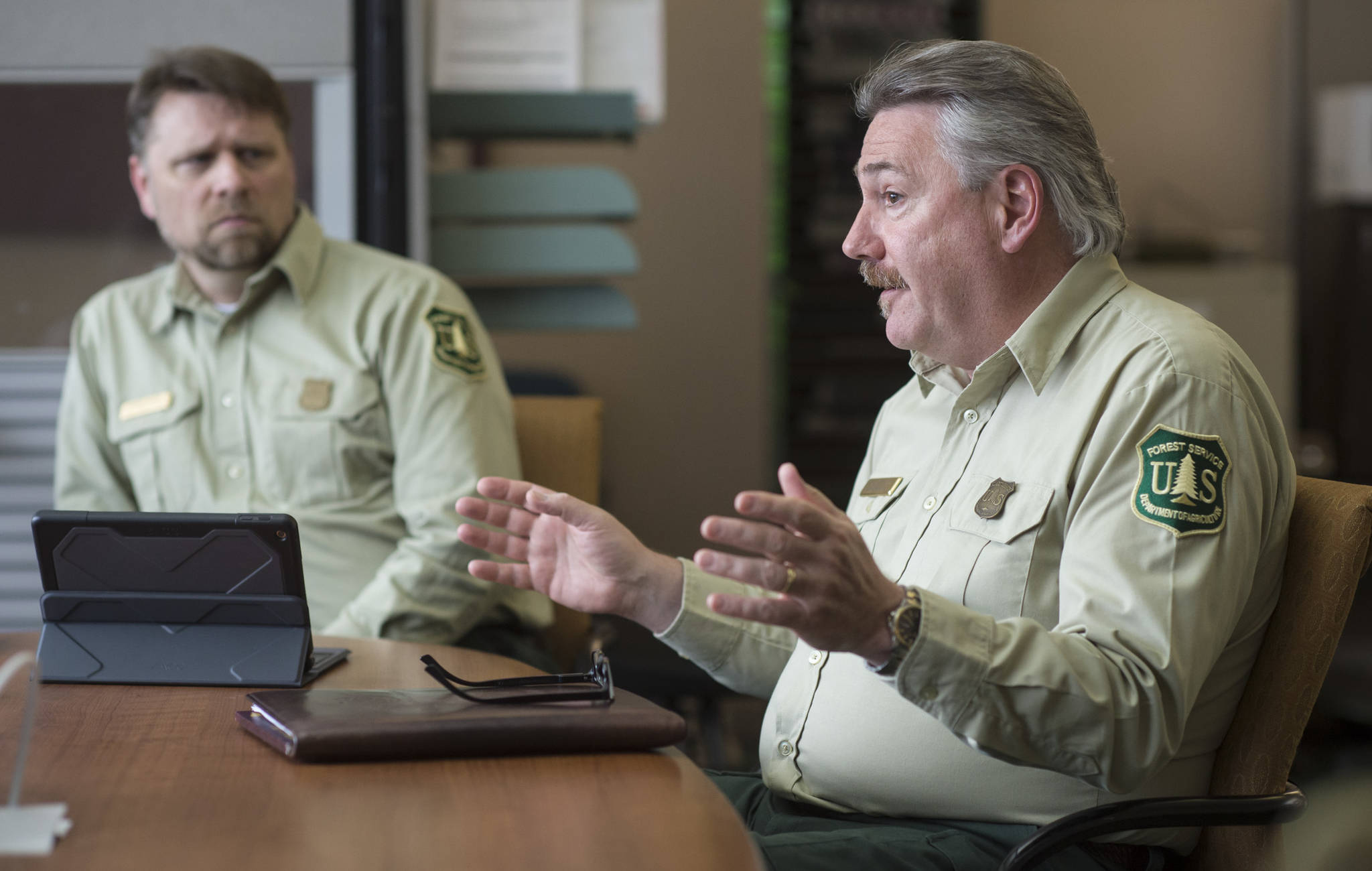More timber may soon be harvested on the Tongass National Forest and the U.S. Forest Service wants to know what the public thinks about that.
A new rulemaking process for an Alaska specific version of the 2001 Roadless Rule — which prevents timber harvest and the building of roads on 7.4 million acres of roadless lands in Southeast Alaska — is now open for public comment.
A Thursday notice published in the Federal Register opens the first official venue for the public to voice its opinion on what opening up new land to timber harvest would mean for the region and the state.
“By working together, we can ensure that this rule helps provide more economic opportunity for Alaskans while sustaining the health, diversity and productivity of the Tongass National Forest,” Tongass Supervisor Earl Stewart said in a prepared statement.
About 45 percent of the 17-million-acre Tongass National Forest isn’t open to timber harvest or the construction or reconstruction of roads under the Roadless Rule. About 20 percent of that total is Congress-designated wilderness blocked from development even under a modified roadless rule.
A new Roadless Rule just for Alaska hasn’t yet been written, but it’s intended to open up some of this land to timber harvest at the behest of the State of Alaska and the USDA Secretary Sonny Perdue. Forest managers are shopping the idea in a series of seven public meetings in Alaska over in September. Written public comments will bolster that outreach effort and help forest managers shape the new regulations.
Juneau’s public meeting kicks off the schedule on Sept. 13 at 5:30 p.m., with a location to be determined.
Anyone interested in voicing their ideas of the future of timber harvests on the Tongass has until Oct. 15 to add their two cents in writing. (More information below).
The push to create a new rule has progressed swiftly.
In January, Gov. Bill Walker issued a petition for a new rule to the U.S. Department of Agriculture on behalf of the state. Walker argued in his State of the State speech that month that that Southeast Alaska’s timber industry was unnecessarily hamstrung by the federal law.”
“Federal restrictions to access in southeast via the 2001 roadless rule have harmed our ability to develop our resources,” Walker said.
Perdue accepted Walker’s petition in April and threw his weight behind the Alaska specific rule after touring Southeast with Sen. Lisa Murkowski in July. Perdue told the Empire in a conference call with reporters that the “the best way to resolve and dissolve the concerns of Southeast Alaska with regard to Tongass, and all the things it affords and the multiple uses there, is to use an exemption for a state-specific, Alaska state roadless rule.”
On Aug. 2, the Forest Service announced its intention to write the Alaska specific rule by entering into a new rulemaking process.
Comments can be submitted electronically at https://www.fs.usda.gov/project/ ?project=54511. Hardcopy comments can be mailed to: Alaska Roadless Rule, USDA Forest Service, Alaska Region, Ecosystem Planning and Budget Staff, P.O. Box 21628, Juneau, Alaska 99802–1628.
All comments, including names and addresses, are placed in the record and are available for public inspection and copying.
Environmental groups respond
In response to Thursday’s opening of public comment, conservationists expressed concern over opening up new public lands to timber harvest. At least one other advocacy group is welcoming the possible expansion of timber harvests in Southeast.
Conservationists criticized the new rule’s intention to revive a nearly extinct timber industry. Timber harvests peaked in the 1970s and declined in the 1980s and 90s, according to the Government Accountability Office. From 2010-2014, less than 50 million board feet were harvested annually in Southeast. That’s down from a peak of nearly 500 million board feet annually from 1970-1979.
From Oct. 2017 to June of this year, the USFS made only one timber sale of a value over $100,000 on the Tongass, according to USFS reports.
Fishing and tourism jobs have increased as a share of the region’s economy and new timber harvests may imperil those industries, wrote Andy Moderow, Alaska Director, Alaska Wilderness League.
“The Walker administration is stuck in the past as it pushes to remove the Tongass from roadless protections. Are we really willing to risk a sustainable future for Southeast Alaska so that the heavily subsidized old-growth timber industry can export more raw timber and local jobs overseas?
“The State’s Petition is contrary to the best interest of Alaskans and harms the real drivers of Southeast Alaska’s economy today – recreation, tourism, guiding, and fishing,” wrote Southeast Alaska Conservation Council Attorney Buck Lindekugel.
Denny Dewitt, of development advocacy group First Things First Alaska, heralded the new rule’s progress, saying it’ll help bring much needed jobs to Southeast’s smaller communities.
“We’re delighted that they’re moving in this direction. We have worked with the federal government and particularly the State of Alaska in developing the Tongass and the Chugach in a fashion that’s more appropriate for our for allowing multiple uses,” Dewitt told the Empire by phone, “that will help provide economic growth for some of our smaller communities. We think it’s a good opening step forward and we’re looking forward to working with the Forest Service.”
• Contact reporter Kevin Gullufsen at 523-2228 and kgullufsen@juneauempire.com. Follow him on Twitter at @KevinGullufsen.

